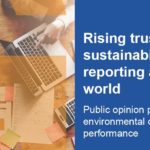The first in-depth examination of corporate sustainability reporting practices in Canada assesses the
quality and coverage of sustainability information that companies provide to the public. It does not
assess corporate performance, but reviews how companies report on their sustainability practices.
Leading the way
Fifty-seven companies in nine sectors prepare environmental, social or sustainability reports in Canada
but the vast majority of companies do not. Twenty-six percent of Canadas 100 largest companies report, placing Canada in the middle of the pack relative to Europe and the U.S.
Sustainability reporting
Reports are evolving from single-issue coverage toward broader sustainability reporting that includes environmental, social and economic aspects of
corporate performance.
Quality of corporate reports varies widely
The issues covered and quality of information provided varies substantially across companies. Based on criteria that reflect emerging international standards for reporting,
Canadian companies report well on environmental discharges, community philanthropy and health and safety. They are weaker in reporting on social
performance and economic contributions beyond the corporate bottom line.
Best practices
Taken together, the reports provide many examples of strong reporting on a range of issues. These reports
provide opportunities for existing reporters to improve and help for non-reporting companies to get started.
Integrated approach
To further improve, reports need to move beyond "stovepipe" descriptions of environmental, social and economic performance to identify linkages across
these factors, and communicate a vision of how they contribute to the long-term success of the company.
Performance information is key
The best reports link corporate commitments to quantitative evidence of performance. This information
is weak in many reports that fail to present measurable targets and to track performance trends over time.
Earning credibility
Good reports are balanced, covering not only improvements in performance but also difficult issues encountered during the reporting period and beyond.
Many reports side-step tough issues and focus only on good news, reducing their credibility.
Building business value through public accountability
Reporting companies are recognizing the benefits of sustainability reporting – in terms of investor and public confidence, improved internal operations, and stronger external relationships with stakeholders.
The next step is for them to move beyond reporting on regulated risks to a more outward looking focus
on business challenges and opportunities.



